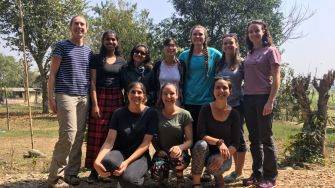- UNSW
- ...
- Humanitarian Engineering
- Global Impact Stories
- Agricultural sustainability in Nepal
- Home
-
Vertically Integrated Projects
-
Explore VIP
- R2: Robo-re-Cycle
- Minex
- Space Power Systems
- 3D 4 Health
- 4D Immersive Surgery
- Mini Solar
- Biological Remediation
- Deep Earth Storage
- Fighting Fires with Science
- AI 4 Everyone
- Connected Health
- Mending broken hearts
- Assistive Tech Hub
- AUStronauts
- Purple House
- Flying Cars - Virtual Reality Simulator
- AtomCraft
- Sunswift Racing
- EASE – Exoskeleton for Assistive Support of Elderlies
- Sunswift Technology
- Student Information
- Benefits of Joining
-
Explore VIP
- Student Projects
-
Humanitarian Engineering
-
Global Impact Stories
- Solar freezer for remote Fijian communities
- Improving drought resistance in Uganda
- Measuring air quality in the South Pacific
- Repairing medical equipment in Uganda
- Brewing up world positive coffee
- Agricultural sustainability in Nepal
- Clean water for Sri Lankan communities
- Repairing medical equipment in Cambodia
- Building resilience to climate change in Tanzania
- Sustainable housing in Cambodia
- Empowering female entrepreneurs in India
- Making an impact in Myanmar
- Solar energy project helps remote Vanuatu villages
- Student Information
- Humanitarian Engineering Thesis Supervisors
-
Global Impact Stories
- Assistive Tech Hub
- Taste of Research
- Contact Us
- Home
-
Vertically Integrated Projects
Explore VIP
- R2: Robo-re-Cycle
- Minex
- Space Power Systems
- 3D 4 Health
- 4D Immersive Surgery
- Mini Solar
- Biological Remediation
- Deep Earth Storage
- Fighting Fires with Science
- AI 4 Everyone
- Connected Health
- Mending broken hearts
- Assistive Tech Hub
- AUStronauts
- Purple House
- Flying Cars - Virtual Reality Simulator
- AtomCraft
- Sunswift Racing
- EASE – Exoskeleton for Assistive Support of Elderlies
- Sunswift Technology
- Student Projects
-
Humanitarian Engineering
Global Impact Stories
- Solar freezer for remote Fijian communities
- Improving drought resistance in Uganda
- Measuring air quality in the South Pacific
- Repairing medical equipment in Uganda
- Brewing up world positive coffee
- Agricultural sustainability in Nepal
- Clean water for Sri Lankan communities
- Repairing medical equipment in Cambodia
- Building resilience to climate change in Tanzania
- Sustainable housing in Cambodia
- Empowering female entrepreneurs in India
- Making an impact in Myanmar
- Solar energy project helps remote Vanuatu villages
- Assistive Tech Hub
- Taste of Research
- Contact Us

Project summary
UNSW academics and students research how to sustainably produce agricultural products and improve irrigation infrastructure in Nepal.
Project outcomes
UNSW Engineering in partnership with Arizona State University, opens in a new window are researching how to sustainably produce the agricultural product biochar, a charcoal soil additive used in farming. Research has shown that the weed commonly known as ‘mile-a-minute vine’ can be converted into biochar.
The second element of the project is focused on improving irrigation with solar-powered equipment.
In May 2017, a new irrigation scheme was installed in a local community and UNSW students are now modelling future design projects.
Make an impact
Contact A/Prof. Fiona Johnson for more information on this project.
Location
Chitwan National Park, Nepal
Population of 28 million
14.5 hour journey from UNSW, Sydney
United Nations Development Goals
SDG 7:, opens in a new window Affordable and Clean Energy
SDG 9:, opens in a new window Industry, Innovation and Infrastructure
SDG 11:, opens in a new window Sustainable Cities and Communities
SDG 12:, opens in a new window Responsible Consumption and Production

